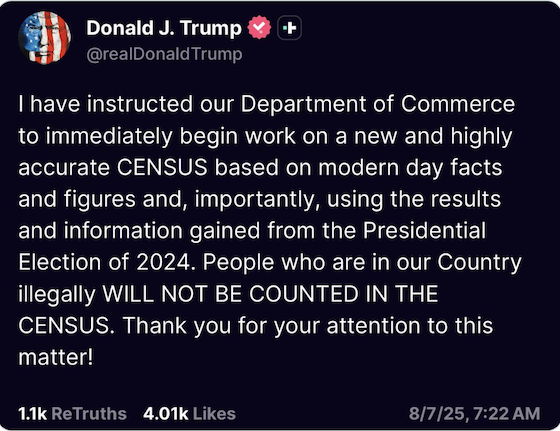President Trump says he is ordering a new census that will not count illegal aliens:
Can the administration do this? If Trump means a census that would have legal effect, there are at least two issues: 1) The Constitution requires that a census be carried out, for purposes of apportioning the House of Representatives, every ten years. Is there a legal basis for doing a census now? 2) Trump doesn’t want to count illegal aliens, but illegal aliens have consistently been counted in the census, at least in modern times. What does the Constitution say about who should be counted?
13 U.S. Code Sec. 141 (d) answers the first question:
Without regard to subsections (a), (b), and (c) of this section, the Secretary, in the year 1985 and every 10 years thereafter, shall conduct a mid-decade census of population in such form and content as he may determine, including the use of sampling procedures and special surveys, taking into account the extent to which information to be obtained from such census will serve in lieu of information collected annually or less frequently in surveys or other statistical studies. The census shall be taken as of the first day of April of each such year, which date shall be known as the “mid-decade census date”.
So a 2025 census is not just permitted, but required. But a quick search suggests that despite subsection (d), no such mid-decennial census has been completed or is in progress. Further:
Information obtained in any mid-decade census shall not be used for apportionment of Representatives in Congress among the several States, nor shall such information be used in prescribing congressional districts.
The mid-decade census is intended, among other things, to be used to re-allocate spending in government programs, not to reapportion Congress. So, contrary to some speculation, nothing the administration does now can impact the 2026 election.
Can the administration conduct an official mid-decennial census that does not count illegal aliens? That depends on both the Constitution and 13 U.S.C. Sec. 141. Article 1, Section 2 says:
Representatives and direct Taxes shall be apportioned among the several States which may be included within this Union, according to their respective Numbers, which shall be determined by adding to the whole Number of free Persons, including those bound to Service for a Term of Years, and excluding Indians not taxed, three fifths of all other Persons.
The 14th Amendment basically repeats this language, post-emancipation:
Representatives shall be apportioned among the several States according to their respective numbers, counting the whole number of persons in each State, excluding Indians not taxed.
The terms used are “numbers” and “the whole number of persons.” I suppose this is why censuses have historically counted illegal aliens–they are persons and part of the “number” of people residing in a state. The constitutional language clearly does not support limiting the census to citizens, since slaves were counted but were not, until 1865, citizens.
On the other hand, certain people undeniably were excluded–“Indians not taxed.” Indians were to be counted in the census if they paid taxes, not counted if they didn’t. The rationale, evidently, is that Indians who pay taxes are part of the polity. They are participating in the civic life of the state, not just passing through. By analogy, one can argue that illegal aliens are like untaxed Indians. Living here illegally, they are not part of the polity that deserves representation in Congress. Still, “the whole number of persons” it tough to get around.
Section 141 uses different, but no more promising, language. It prescribes “a decennial census of population,” and subsection (b) refers to this as a “tabulation of total population by States.” Total population doesn’t seem to leave any wiggle room. Illegal aliens, whatever you may think of their presence, are part of a state’s total population.
So to do an official mid-decennial census that would exclude illegal aliens, I think one would have to argue that Article 1 describes a census population that excludes illegal aliens, and that Section 141 is unconstitutional to the extent that it could be construed as being broader.
When the Constitution was drafted, no one anticipated a future in which ten or twenty million illegal immigrants would be living alongside American citizens and legal residents. It would be more logical for Article 1 to apportion representation in Congress on the basis of citizens, not residents of nearly any sort. But that isn’t what Article 1 says.
Legislation limiting the census (and thus, representation in the House) to citizens actually passed the House of Representatives in May. While the Supreme Court has never ruled on the issue, I find it hard to see how that bill, if it became law, could be upheld under Article 1 and the 14th Amendment.
Of course, there is another possibility: that Trump’s purpose is not legal, but political. Section 141, subdivision (d), says that without regard to prior sections of the law, the Secretary of Commerce shall conduct a mid-decennial census “in such form and content as he may determine.” Here, if Trump follows through, the Secretary will carry out a census that does not include illegal aliens. Whatever the results may be, they can’t be used for reapportioning Congress, or reapportioning districts within a state. They can’t, actually, be used for anything.
But a political point can be made: the vast number of illegal aliens puts a thumb on the electoral scale in favor of the Democrats. If there are 20 million illegals in the U.S., that corresponds to around 26 seats in the House of Representatives. How seats in the House might shift if these persons were eliminated from the count is unclear, but an unofficial census of the kind described by President Trump would shed light on that question, and would highlight the unfair impact of illegal immigration on power in Congress. Also, of course, such an unofficial census could provide a good estimate of the number of illegals still residing in the country.
So, if political as opposed to legal impact is Trump’s goal, he may achieve it.

















